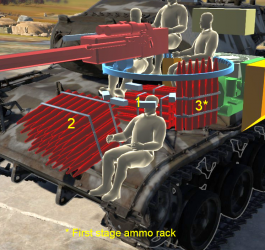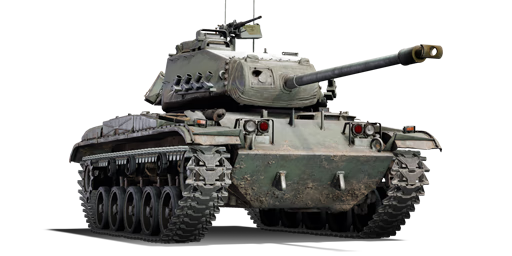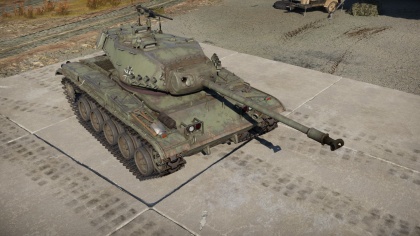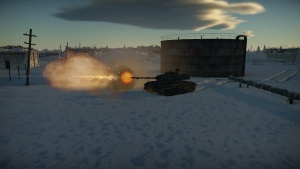LeKPz M41
Contents
| This page is about the German light tank LeKPz M41. For other variants, see M41 Walker Bulldog (Family). |
Description
The leKPz M41 is a rank German light tank
with a battle rating of (AB), (RB), and (SB). It was introduced in Update 1.95 "Northern Wind".
Essentially a West German-operated model of the American M41 Walker Bulldog, the leKPz M41 features smoke grenades and a different ammunition selection in exchange for a higher battle rating. It offers scouting capability, powerful armament, and teammate support in a highly mobile package - especially valuable for players who do not own the premium Ru 251.
General info
Survivability and armour
Armour type:
- Rolled homogeneous armour
- Cast homogeneous armour (Gun mantlet, Lower glacis)
| Armour | Front (Slope angle) | Sides | Rear | Roof |
|---|---|---|---|---|
| Hull | 28.5 mm (49°) Front glacis 63.5 mm (33-37°) Lower glacis |
28.5 mm | 28.5 mm (46°) Top 25.4 mm (1°) Middle 25.4 mm (20°) Bottom |
12.7 mm |
| Turret | 44.4 mm (11-13°) Turret front 50.8 mm (2-43°) Gun mantlet |
31.75 mm (1°) | 31.75 mm (1°) | 12.7 mm |
Notes:
- Suspension wheels, bogies, and tracks are 15 mm thick.
- An extra 12.7 mm RHA metal plate is present on the right side of the turret near the pintle 7.62 mm machine gun.
- A 4 mm Structural steel box is present, mounted on the vehicle rear turret.
The M41's armour is very light and practically useless. With some luck, a few shots may bounce off of the turret if at an angle but don't expect that to happen often. As for the rest of the tank, it has no real armour and will be penetrated by any tank cannons at its rank. However, this means that APDS rounds used by some contemporary tanks will not create much spalling, which limits the post-penetration damage of poorly aimed shots. The armour is thick enough to trigger the fuses on APHE rounds, so be wary of instant knockouts. The most vulnerable part of this tank is the large turret. Three crew members are located here and most shots to the right of the gun will immediately destroy the tank. The turret does have a lot of empty space on the left side of the gun causing most solid shots there to do no damage. Still, avoid keeping the turret exposed, it is an enticing target for APHE rounds and a single one of those can send the tank back to the hangar.
Compared to some other contemporary light tanks like the Ru 251 or T92, the M41 is at least immune to heavy machine guns from the front and sides. It also cannot be hull-broken.
Mobility
| Game Mode | Max Speed (km/h) | Weight (tons) | Engine power (horsepower) | Power-to-weight ratio (hp/ton) | |||
|---|---|---|---|---|---|---|---|
| Forward | Reverse | Stock | Upgraded | Stock | Upgraded | ||
| Arcade | Expression error: Unexpected * operator. | 775 | Expression error: Unexpected round operator. | __.__ | |||
| Realistic | 442 | Expression error: Unexpected round operator. | __.__ | ||||
Armaments
Main armament
| 76 mm M32 | Turret rotation speed (°/s) | Reloading rate (seconds) | |||||||||||
|---|---|---|---|---|---|---|---|---|---|---|---|---|---|
| Mode | Capacity | Vertical | Horizontal | Stabilizer | Stock | Upgraded | Full | Expert | Aced | Stock | Full | Expert | Aced |
| Arcade | 65 | -10°/+20° | ±180° | N/A | 34.27 | 47.44 | 57.60 | 63.69 | 67.76 | 7.67 | 6.79 | 6.25 | 5.90 |
| Realistic | 21.42 | 25.20 | 30.60 | 33.84 | 36.00 | ||||||||
Ammunition
The leKPz M41 has the same ammunition types as the T92. Unlike the original US M41A1, the stock round is the M319 APCR, which has poor angled penetration, low post-penetration damage, and is generally painful to use. Unfortunately, APCR is the only anti-tank round available until Tier 3 of upgrades. If forced to use it, aim for very flat armor, hope that this ends up causing some damage, and allow a teammate to finish the job. The APCR should be replaced as soon as possible by the unlockable M331A2 APDS, which is superior in all aspects. The APDS has high muzzle velocity and penetration, being decent against angled armour as well. It will penetrate the frontal armour of a M26 Pershing or Centurion Mk 3 with ease and can penetrate the turrets of most Soviet tanks. However, the upper glacis of the T-44 and IS-2 (1944) are immune to it, and US heavy tanks like the T34 can be tough customers. The best usage of APDS is for crippling targets. In frontal engagements, try to take out the enemy gunner or cannon breech first, and from the side, shoot for the engine or driver. Additional follow-up shots can be made as necessary to prevent return fire. Once the target is immobilized and neutered, the APDS can be fired at ammo racks or remaining crew members to deliver the coup de grace. This might take a few tries, and it's not uncommon for teammates to swoop in and secure the kill.
The unlockable M496 HEAT-FS round is one of the main selling points of the LeKPz. It has a lower muzzle velocity than the APDS and can be interrupted by bushes or fences, but it does offer slightly better flat penetration and significantly better angled penetration at any distance, which can help against hard targets. It is also more helpful against light targets as the explosive content allows it to hull-break SPAAs and other light tanks. The post penetration damage is otherwise nothing special. While inferior overall to the Ru 251's HEAT-FS, it is still worth taking.
The stock M352 HE shell can cause hull-breaks, but is otherwise useless. Once the HEAT-FS is unlocked, the HE should be avoided as it has significantly worse ballistics and utility in return for only slightly more explosive content.
The leKPz M41 does not have the M339 AP shot or the M361 smoke round from the US M41A1, which makes it more difficult to finish off crippled targets and blind enemies from afar.
| Penetration statistics | |||||||
|---|---|---|---|---|---|---|---|
| Ammunition | Type of warhead |
Penetration @ 0° Angle of Attack (mm) | |||||
| 10 m | 100 m | 500 m | 1,000 m | 1,500 m | 2,000 m | ||
| M319 shot | APCR | 206 | 200 | 174 | 146 | 122 | 103 |
| M352 shell | HE | 12 | 12 | 12 | 12 | 12 | 12 |
| M331A2 shot | APDS | 232 | 231 | 212 | 193 | 163 | 137 |
| M496 shell | HEATFS | 254 | 254 | 254 | 254 | 254 | 254 |
| Shell details | |||||||||
|---|---|---|---|---|---|---|---|---|---|
| Ammunition | Type of warhead |
Velocity (m/s) |
Projectile Mass (kg) |
Fuse delay (m) |
Fuse sensitivity (mm) |
Explosive Mass (TNT equivalent) (g) |
Ricochet | ||
| 0% | 50% | 100% | |||||||
| M319 shot | APCR | 1,234 | 3.2 | N/A | N/A | N/A | 66° | 70° | 72° |
| M352 shell | HE | 732 | 6.8 | 0.1 | 0.5 | 867.2 | 79° | 80° | 81° |
| M331A2 shot | APDS | 1,231 | 1.49 | N/A | N/A | N/A | 75° | 78° | 80° |
| M496 shell | HEATFS | 1,082 | 3.2 | 0.0 | 0.1 | 653.7 | 65° | 72° | 77° |
Ammo racks

| Full ammo |
1st rack empty |
2nd rack empty |
3rd rack empty |
Visual discrepancy |
|---|---|---|---|---|
| 65 | 55 (+10) | 39 (+26) | 1 (+64) | No |
The ammo racks of the leKPz M41 are the same as the original M41A1. Ammunition tends to be stored initially in the fighting compartment and there is an enormous ammo rack to the right of the driver which would normally be a large survivability issue. However, since this is a light tank with little expectation of survivability to begin with, in practice this is not a huge problem. It is still recommended to take less ammo such that the fighting compartment is mostly empty. This way, penetrating rounds with punctual damage are less likely to blow the tank sky-high from shots aimed at the side or at the driver.
Keep in mind that due to the low post-penetration damage of its ammunition, the M41 goes through its APDS and HEAT-FS rounds quickly. Keep a reasonable number of them in stock to avoid having to run to cap zones frequently.
Machine guns
| 12.7 mm M2HB | ||||
|---|---|---|---|---|
| Mount | Capacity (Belt) | Fire rate | Vertical | Horizontal |
| Pintle | 2,175 (200) | 577 | -10°/+70° | ±60° |
| 7.62 mm M1919A4 | ||||
|---|---|---|---|---|
| Mount | Capacity (Belt) | Fire rate | Vertical | Horizontal |
| Coaxial | 4,900 (250) | 500 | N/A | N/A |
Usage in battles
The leKPz M41 is best used as a support tank, covering teammate advances and scouting enemies from afar. While it can be used for brawling, the terrible armour, bouncy gun handling, and inability to destroy enemies quickly mean that this role should be left to other tanks if possible.
At the start of the match, use the mobility to move up and find a good vantage point. Stick close to cover and watch carefully for enemies. When they appear, scout them and wait for an opportune time to attack, perhaps when they have been distracted by teammates or are not looking in the M41's direction. As mentioned earlier, it is important to cripple enemies quickly quickly and efficiently to avoid return fire, at which point they can be dismantled at one's leisure or left for teammates to clean up. A good M41 user can keep multiple tanks disabled at the same time, turning the tide of battle.
Move up or otherwise switch positions every once in a while to avoid retaliatory flanks or bomb deliveries, and keep a comfortable distance away from where enemy tanks are expected to appear. Only advance to capture points if the coast is clear, and again, this job is better left to heavier tanks. Note that unlike the Ru 251, the M41's large profile and comparatively worse mobility make long flanks and aggressive pushes more risky, and these tactics are not preferred.
The good optics, decent gun depression, and high velocity APDS/HEAT-FS make the M41 a good sniper. Most enemies that it will encounter do not require precise aiming to penetrate unless the tank has been uptiered. Just be prepared to reverse into cover or pop smoke if the target only sustains superficial damage. Watch out for other light tanks like the T92, M56 Scorpion, and Type 63-I. They are capable of dispatching the M41 with ease and their high mobility makes them difficult to account for when wrangling multiple opponents. The best tools against these are HEAT-FS and the M2 Browning machine gun. Thankfully, as a German tank, the M41 will usually not face the Ru 251 in realistic battles.
Stick close to trees or tall buildings if aircraft are around. The M41's size and bulbous turret makes it easy to spot and even aircraft armed with heavy machine guns can penetrate the roof easily. It should go without saying that bombs and rockets are also very lethal.
Remember to scout enemies as often as possible. This makes it much easier for your teammates to stay alive and dispatch them, and when the latter happens a reward is given and the SP cost of aircraft is reduced. A successful run can result in very cheap aircraft spawns, which is a good consolation if the M41's career ends with a revenge bomb or untimely snipe from a camping opponent. Do not fret if not many kills are achieved, it is common to rack up lots of assists and still contribute a lot to the team - definitely nice considering the difficult stock grind.
Modules
| Tier | Mobility | Protection | Firepower | |||
|---|---|---|---|---|---|---|
| I | Tracks | Parts | Horizontal Drive | |||
| II | Suspension | Brake System | FPE | Adjustment of Fire | Airstrike | |
| III | Filters | Crew Replenishment | M331A2 shot | Elevation Mechanism | NVD | |
| IV | Transmission | Engine | Smoke grenade | M496 shell | Artillery Support | Improved optics |
Pros and cons
Pros:
- Agile tank, has good reverse speed and can turn in place
- Good top speed 72 km/h (average speed is more around 35-40 km/h)
- Fast turret traverse
- Fast reload rate
- Has access to the same HEAT-FS shell as the T92
- .50 cal AA machine gun with good coverage, for use against aircraft and light targets
- Equipped with smoke grenade launchers
- Can fulfill the role of the Ru 251 for players that don't have it
Cons:
- Large profile for a light tank
- Bad armour, can be ripped to shreds by all the AA guns at the tier
- Armour is thick enough to fuse APHE rounds
- All ammo types cause punctual post-penetration damage
- Painful stock grind that begins with an APCR stock shell
- HEAT-FS is mediocre
History
Development
The U.S. Army light tank in the latter part of World War II, the M24 Chaffee, was a promising design but was deemed not effective for the future of armour encounters. Though its role as a scout was seen as needing the 75 mm gun, the army wanted a tank with a better gun to have a more equal chance against tanks. The project began as the T37 program in 1947 with the focus of being air-transportable with an anti-tank capability in the form of a 76 mm gun and a rangefinder. The adoption of a simplified rangefinder had the project designation changed to the T41. After testing and evaluations, the T41 model was accepted into service as the M41 Little Bulldog , with production starting at Cadillac Cleveland Tank Plant in 1951. The name Little Bulldog stayed until General Walton Walker, the first commander of the 8th US Army in Korea, died in a car accident, so the tank was renamed into the M41 Walker Bulldog in remembrance. Production went from 1953 to somewhere in the late 1960s with about 3,728 units produced.
The M41 light tank would go on to replace the M24 Chaffees by 1953. The M41 had a crew of four, commander, gunner, loader, and driver. The tank had a profile of under 9 feet and 19 feet long. The tank was lightweight at 23.5 tons and thus had rather thin armour, with the front armour only 25.4 mm thick (sloped at 60 degrees for about 50 mm effective). However, the tank was very agile with its torsion bar suspension and Continental AOS 895-3 series 6-cylinder gasoline engine of 500 hp which could deliver a road speed of 45 mph with a 100 miles operating range. Unfortunately, the tank was criticized for being noisy, a fuel-guzzler, rather heavy, and the American crewman found the Bulldog's interior to be quite cramped. Despite that, it delivered speed, firepower, and reliability in a light tank format. Several upgrades were made on the M41 with better technology, the M41A1 had a hydraulic turret traverse with more ammo storage, the M41A2 had a new fuel system, and the M41A3 are old M41A1 tanks with the new fuel system from the M41A2.
Combat usage
The M41 Walker Bulldog first saw use in Korea in a limited combat run. The tanks, still labelled their experimental designation T41, were sent for field testing on design deficiencies. It is unknown what other purposes they served there except for the tests. Their first major conflict once adopted by the U.S. Army was in Vietnam, mainly by replacing the M24 Chaffees in service with the South Vietnamese army (ARVN) at the time. The M41A3 tanks arrived in January 1965 and were instantly popular; not only for their advantages, but the previously cramped interior for American crews were actually a perfect fit for the smaller Vietnamese armour crewman. The Bulldog went on to fight in the Vietnam War as a reliable war machine. The Bulldog had an advantage due to its lightweight in manoeuvring in the jungle terrain of the region. In 1971, Operation Lam Son 719, the disruption of the North Vietnamese Army supply lines had the M41 Bulldogs play a major role, accompanied by two airborne battalions and two cavalry regiments. Penetrating deep into enemy lines, the 17 M41 tanks engaged and destroyed six Soviet-designed T-54 tanks and other lighter armoured vehicles. This engagement came at a loss of 5 M41 and 25 armoured personnel carriers. By 1973, the ARVN still used about 200 M41 tanks while the transition of the American unit over to the M48A3 Patton tanks in Europe and Stateside. The M41 light tanks were also exported to various other countries. Today, Guatemala, Somalia, Taiwan, Uruguay, and Vietnam still use the M41 Walker Bulldog, some via upgrading the tanks to extend their service life.
The M41 Walker Bulldog design was advanced for the time, giving a relatively lightweight tank the firepower to take on other tanks of its time period. The chassis was even used on the M42 Duster Anti-Air gun and the M75 Armored Personnel Carrier. The drive, engine, transmission, and auxiliary engine also were used in the M44/M52 155 howitzer. By 1969, the US Army began replacing the M41 with the newer M551 Sheridan Armored Airborne Reconnaissance Assault Vehicle (officially not a "light tank") which had a 152 mm cannon that could fire shells and anti-tank missiles. The M551 Sheridan could be used in roles that the M41 Walker Bulldog couldn't do, such as be air-dropped and amphibious but was rather unreliable. This made the M41 Walker Bulldog to be the last American "light tank" produced and the last made before the classification between tank classes based on weight and role ended.
Usage by the Bundeswehr (leKPz M41)
The leKPz M41 (short for leichter Kampfpanzer M41 (light MBT M41) was the Bundeswehr variant, serving in the West German Army from 1956 to 1969. The leKPz M41's served in Panzeraufklärungsbatallionen (tank reconnaissance batallions) and Panzerjägerbataillionen (tank destroyer batallions). Very few served in Panzergrenadierbataillionen (tank grenadier bataillions). From 1969, the leKPz M41 was replaced by the Leopard 1 in reconnaissance bataillions and by tank destroyers like the JPz 4-5 and the RakJPz 2 in tank destroyer bataillions. Variants with a slightly modified chassis of the M41 remained in service in the form of SPAA (Flakpanzer M42) as well as in the form of tank howitzers (lePzH M52 and mPzH M44).
Media
- Images
- Videos
See also
Links to the articles on the War Thunder Wiki that you think will be useful for the reader, for example:
- reference to the series of the vehicles;
- links to approximate analogues of other nations and research trees.
External links
| Germany light tanks | |
|---|---|
| Pz.II | Pz.II C · Pz.II C (DAK) · Pz.II C TD · Pz.II F · Pz.Sfl.Ic |
| Sd.Kfz.234 | Sd.Kfz.234/1 · Sd.Kfz.234/2 · Sd.Kfz.234/2 TD |
| Marder | Marder A1- · Marder 1A3 · Begleitpanzer 57 · DF105 |
| SPz PUMA | PUMA · PUMA VJTF |
| Wheeled | Sd.Kfz.221 (s.Pz.B.41) · Class 3 (P) · Radkampfwagen 90 · Boxer MGS |
| Other | Ru 251 · SPz 12-3 LGS |
| Argentina | TAM · TAM 2C · TAM 2IP · JaPz.K A2 |
| Czechoslovakia | Pz.35(t) · Pz.38(t) A · Pz.38(t) F · Pz.38(t) n.A. · Sd.Kfz. 140/1 |
| France | Pz.Sp.Wg.P204(f) KwK |
| Lithuania | Vilkas |
| USA | leKPz M41 |
| USSR | SPz BMP-1 |






